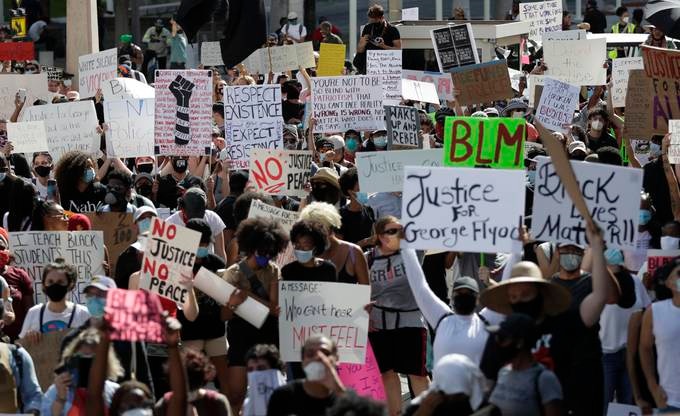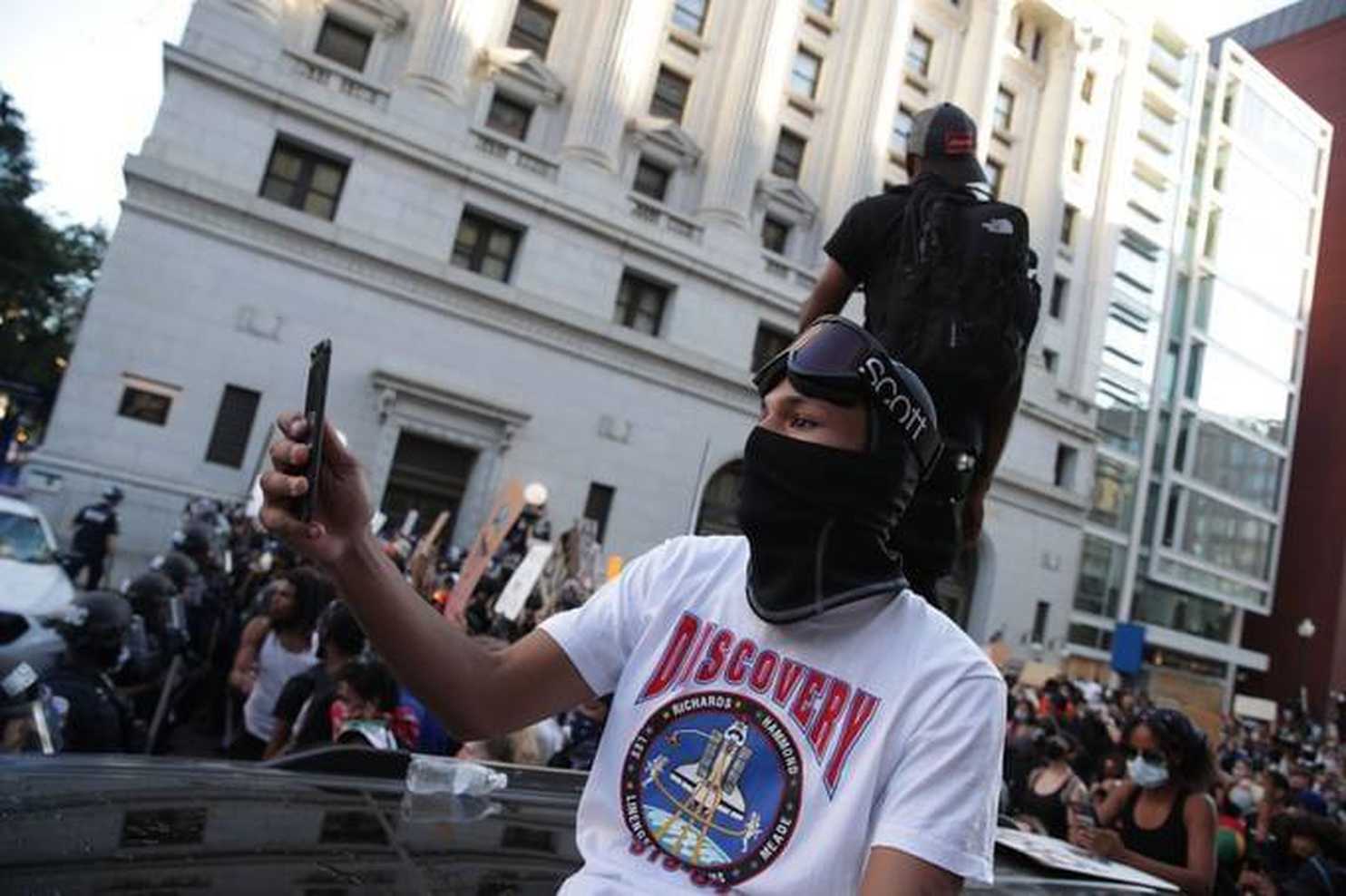with Tonya Riley
Silicon Valley giants are about to be tested in unprecedented ways.
Widespread racial unrest, a pandemic and a presidential election could bring a flood of disinformation on social media platforms in the coming months. It’s a perfect storm: All this is happening as the companies struggle to develop and enforce content moderation policies – with more limited staff and operations due to the coronavirus pandemic.
Policymakers and disinformation experts are already raising concerns that online activism in the wake of the killing of George Floyd could be hijacked by bad actors.
A protester uses his phone during a rally against the death in Minneapolis police custody of George Floyd, in Washington, D.C., U.S. May 31, 2020. REUTERS/Jonathan Ernst
Marco Rubio (R-Fla.) who temporarily chairs the Senate Intelligence Committee, warned on Saturday that foreign adversaries were already ramping up activity related to the protests.
Tonight seeing VERY heavy social media activity on #protests & counter reactions from social media accounts linked to at least 3 foreign adversaries.
They didn’t create these divisions. But they are actively stoking & promoting violence & confrontation from multiple angles.
— Marco Rubio (@marcorubio) May 31, 2020
He did not point to specific activity or identify the actors, and his office didn’t respond to a request for comment.
Experts are calling on social media users to exercise caution and check their sources before they hit retweet or share. From Kate Starbird, an associate professor at the University of Washington:
Please vet your sources. Don’t retweet someone you don’t know without figuring out who they are why they’re there. Don’t add new follows without doing a deep dive of those accounts. We are really vulnerable to information operations during these tumultuous times.
— Kate Starbird (@katestarbird) May 30, 2020
Bad actors, both foreign and domestic, have in recent years exploited major news events and polarizing situations to sow divisions.
Race has been a core component of this: A report commissioned by the Senate Intelligence Committee in 2018 found that Russia engaged in sustained attempts to target black voters and stoke existing racial tensions ahead of the last presidential election. Domestic provocateurs have increasingly taken a page out of their playbook. President Trump’s tweets blaming the far-left “antifa” movement for violent protests – and Minnesota officials’ suggestions white supremacists were responsible for mayhem in their state – seem primed for disinformation as actors seek to exacerbate the divisions.
The companies insist they’re prepared. Twitter said it would take action on any coordinated attempts to disrupt conversation around the protests, and that it is staffed appropriately for the work. YouTube said it has yet to see any foreign adversaries on its platform targeting the protests, but pledged to continue to be vigilant. Facebook said it is constantly monitoring for coordinated inauthentic behavior, and it reports when it takes action against accounts monthly.
But journalists and researchers are identifying falsehoods going viral on the platforms amid the mayhem and confusion of the protests. Jane Lytvynenko and Craig Silverman have been tracking hoaxes: They debunked a post that had more than 15,000 retweets claiming that a McDonald’s restaurant was burning down in the Minnesota protests. The photo was actually in Pennsylvania in 2016. They also fact-checked a tweet claiming there was an explosion inside a police precinct in Minneapolis; the explosion depicted was actually from a Chinese city in 2015.
Companies are already dealing with major backlash over their content moderation practices.
Facebook’s own employees are taking the extremely rare step of speaking out publicly against the company’s decision not to take action against a post from Trump last week that said “when the looting starts, the shooting starts.” The post gained traction on both the Facebook and Instagram services, while Twitter shielded it from public view and prevented it from being liked, retweeted or replied to.
Notably, the employees are voicing their criticism of Facebook chief executive Mark Zuckerberg’s decision on Twitter:
I work at Facebook and I am not proud of how we’re showing up. The majority of coworkers I’ve spoken to feel the same way. We are making our voice heard.
— Jason Toff (@jasontoff) June 1, 2020
The criticism is emerging after Axios reported that Facebook chief executive spoke on the phone with Trump about the controversial post.
Facebook is also facing backlash from the outside. Roger McNamee, an early Facebook investor and the author of “Zucked: Waking Up to the Facebook Catastrophe,” compared the company to an old chemical company spewing toxins into the environment during a CNN interview.
Facebook is polluting our society and the harm is comparable to factories dumping mercury in fresh water or pumping toxins into the air. https://t.co/LWvzOHHmOU
— Roger McNamee (@Moonalice) May 31, 2020
The companies are not presenting a united front as they spar over how to handle Trump’s controversial posts.
Tech companies have at times worked with one another to address problematic content on their platforms — such as in instances of terrorist content and the run-up to the 2018 midterm elections. Not so in this case. Twitter has been cracking down on President Trump’s posts in new ways as Facebook chooses not to moderate them.
Zuckerberg defended Facebook’s decision not to label President Trump’s comments about mail-in voting during an interview on Fox News. He said he didn’t believe digital platforms should act as the “arbiter of truth of everything that people say online.” But Twitter’s chief Jack Dorsey clapped back at Zuckerberg in a series of tweets, saying his platform is not an arbiter of truth either but would continue would to point out incorrect or disputed information about elections.
Trump’s efforts to seek political revenge from Silicon Valley just puts another plate in the air. Trump signed an executive order taking aim at a key legal shield that protects tech companies from lawsuits for the photos, videos and posts people share on their services. The president signed the order that would direct federal regulators to review the scope of the provision, known as Section 230, after Twitter’s decision to label two of his tweets.
The challenge for the companies only gets tougher as coronavirus limits human content moderation teams.
Fewer moderators are working due to the privacy and mental-health concerns about people doing this sensitive work from home. YouTube tells me that is continuing to operate with a reduced human content moderator force.
Facebook says its moderators are getting back to work, after it warned it would be making content moderation mistakes during the pandemic because of an increased reliance on artificial intelligence.
“Over the last several months the majority of the reviewers employed by our partners have been successfully transitioned to work from home,” Facebook spokesman Andy Stone said.
Twitter’s content moderator staffing has returned to normal levels, according to the company.
Our top tabs
Several major tech companies are making commitments to donate to racial justice organizations in the wake of Floyd’s death.

Protesters demonstrate in front of the Federal Detention Center on Sunday in Miami. (Wilfredo Lee/AP)
Zuckerberg pledged to donate $10 million to groups working for racial justice. He also noted that the Chan Zuckerberg Initiative, the philanthropic effort he runs with wife Priscilla Chan, has been investing $40 million a year in such organizations.
Apple chief executive Tim Cook wrote in a memo to employees the company would be donating to groups including the nonprofit Equal Justice Initiative, Bloomberg News reported. The company would also offer two-for-one matching for employee donations in June.
YouTube pledged $1 million on Friday:
We stand in solidarity against racism and violence. When members of our community hurt, we all hurt. We’re pledging $1M in support of efforts to address social injustice.
— YouTube (@YouTube) May 30, 2020
Box chief executive Aaron Levie committed to donating $500,000 more to organizations working on racial justice. Levie also donated $5,000 to the Minnesota Freedom Fund.
We have profound racial injustice in our society. George Floyd. Ahmaud Arbery. Breonna Taylor. Enough is enough. @joelle_emerson and I are committing $500,000 to support organizations that are doing important work in this space. Let us know if you have any orgs to recommend.
— Aaron Levie (@levie) May 29, 2020
Snap chief executive Evan Spiegel went further than most executives and called for a reparations commission and radical tax changes to address social injustices in America against black people, The Information reports. He shared this call in a letter to employees, where he said he was “heartbroken and enraged” by racism in America.
More than three dozen tech companies or tech chief executives have tweeted or shared a statement in support of black employees and communities, journalist Sherrell Dorsey found. Amazon, which has reduced deliveries in some cities amid the protests, was one of the companies that released a statement in solidarity with the black community yesterday. (Amazon CEO Jeff Bezos owns The Washington Post.)
But civil liberties groups who have called out Amazon for its extensive work with the police and more recent mistreatment of black warehouse workers were quick to bring up the company’s past behavior:
The American Civil Liberties Union:
Cool tweet. Will you commit to stop selling face recognition surveillance technology that supercharges police abuse? https://t.co/DfnAhyw2PW
— ACLU (@ACLU) May 31, 2020
Fight for the Future:
Amazon shows its solidarity by:
-Firing Black employees who speak out about unsafe warehouse conditions
-Forming more than 1,000 Ring doorbell surveillance partnerships with police departments
-Selling racially biased facial recognition software to cops https://t.co/xaTIExSCXp
— Fight for the Future (@fightfortheftr) May 31, 2020
The semiconductor industry is lobbying for billions in funding to bring manufacturing to the United States amid coronavirus-related tensions with China.

President Trump returns from the SpaceX Falcon 9 launch. (Patrick Semansky/AP)
A new crop of proposals from an industry trade group includes billions in subsidies for a new chip factory, aid for states looking to attract industry investment and increased research funding, the Wall Street Journal reports.
The push could find support from both the White House and bipartisan members of Congress who have seen strengthening the U.S. semiconductor industry at home as a key component to reducing reliance on Chinese hardware.
“The Trump administration is committed to ensuring the United States has a secure, vibrant, and internationally competitive high-tech ecosystem, supported by domestic chip production,” said Commerce Secretary Wilbur Ross. Last month the White House moved to make it harder for Chinese companies to use U.S. chip-making technology.
But there’s disagreement within the industry over how potential subsidies should work, the Journal reports. And some smaller players are worried that some of the proposals being discussed would cause U.S. states to compete with each other instead of China.
SpaceX founder Elon Musk has his eyes on Mars after the company’s first successful human launch mission.

SpaceX founder Elon Musk jumps in the air after the manned SpaceX Falcon 9 Crew Dragon Demo-2 mission. (Erik S. Lesser/EPA-EFE/Shutterstock)
The company launched two NASA astronauts into space on Saturday and successfully docked them at the International Space Station yesterday, making it the first private company to do so in the history of space flight. It’s a success that few thought would be possible, Christian Davenport reports.
The mission is just one step toward Musk’s ambitious goal of sending humans to Mars. First, the company will focus on flying another mission with astronauts to the International Space Station late this summer. The company also recently won a contract from NASA to build a spacecraft that could land humans on the moon
“I didn’t feel nervous. I felt like it was going to work,” Musk said on Saturday.
It’s the kind of determination the company will need to actually make it to Mars, Christian notes. On Friday, a prototype test of the rocket SpaceX is building to send to Mars blew up in a test.
Rant and rave
BuzzFeed reporter Caroline Haskins breaks down the surveillance technology powering police in Minneapolis:
There’s a couple scoops here:
The Minneapolis PD, the Hennepin County Sheriff’s Office, and the Minnesota Fusion Center have all used Clearview AI’s facial recognition toolhttps://t.co/fOrjOsTEaA
— Caroline Haskins (@carolineha_) May 29, 2020
“The idea that you have groups of people that are raising legitimate concerns and now that could be subject to face recognition or surveillance… amplifies the overall concerns with law enforcement having this technology to begin with.”
– @neemagulianihttps://t.co/fOrjOsTEaA— Caroline Haskins (@carolineha_) May 29, 2020
Workforce report
Microsoft is laying off dozens of journalists employed by its news arm.

The Microsoft logo. (Altaf Qadri/AP)
The layoffs come as part of a push to rely more on artificial intelligence to pick news content displayed on MSN.com and in Microsoft news apps, the Verge reports.
Trending
Daybook
- The House Homeland Security Committee will host a panel “Election Security and Integrity During a Pandemic” at 3 p.m. today.
- George Washington University’s Institute for Data, Democracy, and Politics will host a virtual forum on covid-19 and social media disinformation on June 16 at 10 a.m.
Before you log off
More views from SpaceX’s historic mission:














